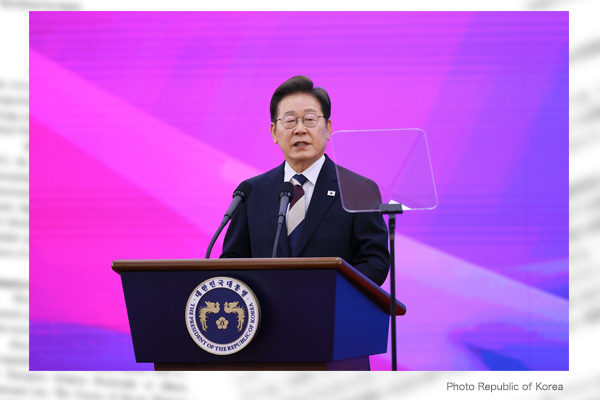In the South Korean presidential election, Lee Jae Myung of the Democratic Party of Korea was elected as the new president. He won 49% of the vote, against 41% for Kim Moon So of the conservative People Power Party, which was the ruling party under the previous Yoon Suk Yeol government, and 8% for Lee Jun Seok of the Reform Party, a newly formed conservative party.
The election came following the impeachment of then-President Yoon for unconstitutionally declaring martial law in December. Lee Jae Myung and Lee Jun Seok were of the view that the declaration of martial law was unconstitutional and unacceptable. The two together received nearly 60% of the vote. The left-wing Hankyoreh newspaper wrote that “voters gave a judgment on the rebellion.” The most significant aspect of the election is that South Korea’s liberal democracy held the president accountable for his unconstitutional martial law declaration within the framework of the rule of law.
Lee: pragmatist rather than extreme leftist
Immediately after Lee Jae Myung’s election as president, the National Assembly, dominated by his Democratic Party of Korea, passed bills to appoint special prosecutors to investigate Yoon’s martial law declaration as a rebellion and various criminal allegations against Yoon’s wife, Kim Keon Hee. President Lee will refrain from vetoing the bills, allowing them to be enacted this week. It remains to be seen whether the investigations will be rigorous based on law and evidence or political enough to amount to retaliation against political opponents. For the time being, the Lee government can do whatever it wants, given his party’s dominance in the National Assembly and the weakening of opposition parties.
A conservative intellectual says: “President Lee has been given conditions for any saint to be motivated to become a dictator. We are in a precarious situation in which we have no choice but to rely on his integrity.” Veteran journalists who have covered South Korean politics for a long time say: “The Lee government is quite different from the Moon Jae In government that pursued pro-Pyongyang and anti-Japanese policies by politically retaliating against conservatives. Lee is differentiated from Moon, who is known as an extreme leftist and a Juche (self-reliance) philosopher. Lee is a pragmatist and opportunist who has risen from the bottom of society.”
Comfort women issue may flare up again
Lee, who grew up in poverty and rose to become president, is now focused on being a successful president. In order to do so, he will not hesitate to boldly contradict his past words or actions, prioritizing his own success over ideology. During his presidential campaigns, Lee repeatedly stated that he would consider the Korea-U.S. alliance and the Korea-U.S.-Japan trilateral cooperation the cornerstones of his foreign policy, as he recognized that doing so was essential for his success as president.
Immediately after taking office, Lee made it clear that he would maintain the framework of third-party reimbursement system created by the previous government on the issue of Korean wartime workers in Japan, which could badly strain Japan-South Korea relations if mishandled. On the issue of comfort women, however, Lee pledged to promote a new law that would impose criminal penalties on those who defame them, to seek UNESCO (United Nations Educational, Scientific and Cultural Organization) registration for records related to comfort women, and to protect existing comfort women statues and promote the installation of new ones worldwide.
I am worried that the scholars who wrote “Anti-Japan Tribalism” and activists who have been calling for the removal of comfort women statues could face a crackdown. But the pledge may be designed to ease domestic frustration rather than turning the comfort women issue into a diplomatic dispute. If faced with public criticism for economic policy or other failures, however, the Lee government may well exploit emotional anti-Japanese sentiment to restore public support. Japan should be cautious about offering apologies.
Tsutomu Nishioka is a senior fellow and a Planning Committee member at the Japan Institute for National Fundamentals and a specially-appointed professor at Reitaku University. He covers South and North Koreas.


